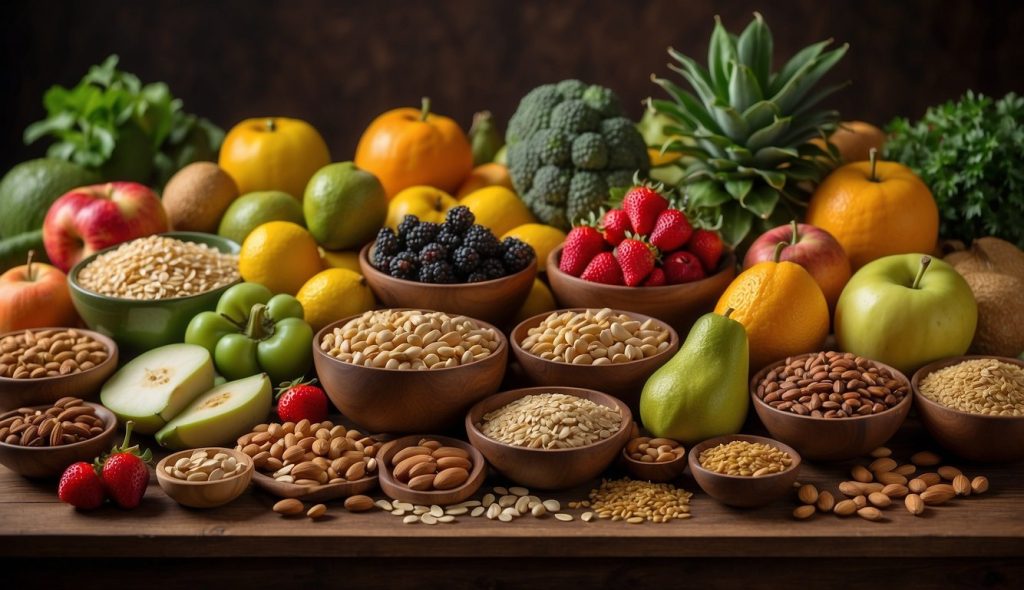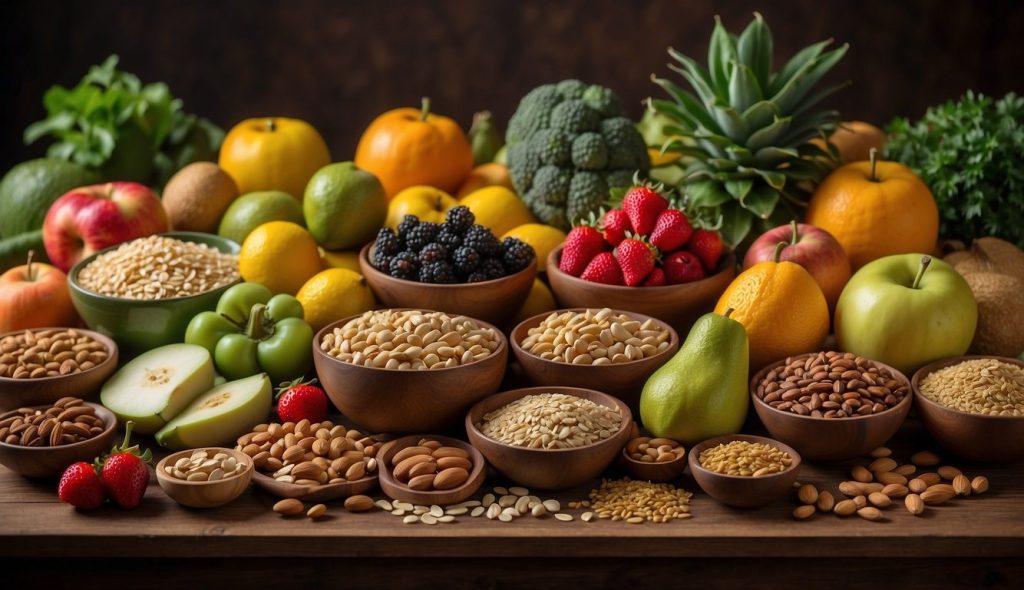Adopting a plant-based life is a decision that benefits not only your health, but also the environment. When you explore plant-based nutrition, you’ll find that it means eating vegetables, fruits, and whole foods. Eating fewer animal products can improve heart health, weight loss, and energy.

A healthy plant-based diet is not only vegan. It prioritizes plant foods and avoids processed and animal-derived ingredients. As you start this journey, add many different vegetables and fruits to your meals. This will make sure your diet is rich in vitamins, minerals, and fiber. Daily wellness practices and healthy habits are key to a sustainable plant-based lifestyle. It goes beyond diet quality to include all aspects of wellbeing.
Lifestyle medicine shows that making proactive changes in your eating can greatly affect your health. By eating a plant-centered diet, you’re choosing to nourish your body with nutrient-rich foods. You’re also moving towards a lifestyle that promotes both personal and planetary health. Remember, switching to plant-based eating patterns is a process. Even small changes can greatly impact your wellness journey.
Definition of Plant-Based Life Diet

A healthy, plant-based life diet emphasizes foods from plants. This includes a variety of vegetables, fruits, grains, legumes, nuts, and seeds. The focus is on whole, minimally processed foods that are rich in nutrients.
Whole Foods, Plant-Based Diet: A subset of the plant-based diet is the whole foods, plant-based diet (WFPB) diet. In adhering to a WFPB diet, you prioritize food in its most natural form.
Nutrition: Some have worried, but a good plant-based diet can provide all the nutrition your body needs. This includes:
- Proteins: Legumes, tofu, and tempeh contain ample protein.
- Fats: Healthy fats come from nuts, seeds, and avocados.
- Carbohydrates: Whole grains and root vegetables are great sources.
- Vitamins and Minerals: A diverse intake of fruits and vegetables provides a myriad of vitamins and minerals.
Dairy Alternatives: You can choose from a range of non-dairy alternatives made from soy, almonds, oats, and coconuts.
Animal-Based Foods: While some people on a mostly plant-based diet still consume animal products, they do so in moderation. People limit or eliminate traditional animal-based foods like meat, dairy, and eggs.
Growing Popularity of Plant-Based Lifestyles
Adopting a plant-based lifestyle is more than just a trend. It’s a growing movement that shows your progressive approach to health, the environment, and animal welfare. Eating mostly plants is central. This includes not only fruits and vegetables but also nuts, seeds, oils, whole grains, legumes, and black beans.
If you’re considering a transition to a plant-based life, you’re not alone. Since 2014, the number of Americans identifying with low-fat vegan diets has surged a lot. This shows a shift towards lifestyle changes based on compassion and sustainability. The rise in convenience is driving this growth. Vegan food delivery orders are up 17%. They make it easier for you to embrace new habits.
Beginning a plant-based transition might seem daunting, but there is a growing supportive community ready to help. From online forums and local meet-ups to widespread media, connecting with others helps create good habits. It also provides a shared knowledge base. This community can offer insights. They can help you keep meal plans in balance. They can do this while aligning with your values.
Key Statistics:
- Plant-based burgers orders rose by 28%.
- Vegetarian diet food orders have seen a 55% increase.
- Market size for plant-based foods stands at a staggering $7.4 billion.
Major Benefits of a Healthy, Plant-Based Diet
Eating a plant-based diet can boost your health. It can help with healthy weight loss, weight management and provide key nutrients. Delving deeper, you’ll discover a range of advantages that warrant consideration.
Health Benefits
Eating fewer animal products lowers the risk of chronic diseases. These include heart disease, type 2 diabetes, and some types of cancer. Studies have shown that a diet rich in plants can help maintain healthy blood pressure and blood sugar levels. It can also reduce inflammation. These health outcomes depend on key components. These include fiber, antioxidants, and phytochemicals in fruits, vegetables, legumes, and nuts.
- Lower blood pressure: Diets low in saturated fat can help. Saturated fat is mainly found in meat and some dairy products.
- Reduced risk of heart disease: Replacing meats with meat and dairy alternatives that are lower in saturated fat can help reduce the risk.
- Cancer prevention: A diet filled with varied plant foods provides many compounds. These may protect against cancer.
Body Weight Management
Plant-based diets can help with weight management. They have more fiber. This fiber increases fullness and can lead to eating fewer calories. They usually have fewer calories than diets with more animal products. This makes them useful for those aiming to lose or maintain a healthy weight.
Nutritional Aspects of Plant-Based Diets

Plant-based foods are nutritious. They offer many vitamins, minerals, and other beneficial compounds. These include antioxidants and phytochemicals. Here is a basic breakdown:
- Proteins: Legumes, nuts, seeds, and soy products provide your body with essential amino acids. They do this without lots of saturated fat.
- Healthy fats: Avocados, seeds, and nuts contain heart-healthy fats. They have less impact on the environment than common dairy and meat.
- Vitamins and minerals: Vegetables, fruits, and whole grains have many nutrients. They support a variety of bodily functions.
Also, a plant-based diet nurtures your health. It can also help the environment by cutting greenhouse gas emissions from livestock farming. Your dietary choices can extend benefits beyond personal health, contributing to environmental sustainability.
Plant-Based Life: Frequently Asked Questions
Q: How do you live a plant-based life?
A: Living a plant-based life means you eat mostly foods that come from plants. This includes fruits, vegetables, nuts, seeds, oils, whole grains, legumes, and beans. It doesn’t mean you are only eating plants, but they are the main part of your meals. You’ll focus on real, whole foods and cut down on processed stuff. Think of filling your plate with a rainbow of natural foods that come from the earth. Plus, you’ll drink lots of water and choose plant-based options when you can, like almond milk instead of cow’s milk. It’s all about making choices that are good for you and the planet.
Q: Can I eat eggs in a plant-based life?
A: On a plant-based diet, you usually don’t eat eggs because they come from animals. The focus is on eating foods that are from plants, like veggies, fruits, grains, nuts, and seeds. Some people include a bit of animal foods. But, if you want to stick to a strict plant-based diet, you’d skip the eggs. You’d eat lots of other nutritious plant foods. It’s all about finding what works best for you and your body’s needs.
Q: What is the downside of a plant-based life?
A: One downside of a plant-based life might be that it takes more planning. You must ensure you get all the nutrients you need, like protein, iron, calcium, and vitamin B12. These nutrients are more easily found in animal foods. You might also miss out on some social eating if your friends or family aren’t into plant-based meals. But don’t worry! With a little research and creativity, you can cook up delicious dishes. They can be full of all your body needs and let you enjoy meals with your loved ones.
Q: Is pasta OK in a plant-based life?
A: Yes, pasta can be part of a plant-based life. Just look for pasta made from plants, like whole wheat, brown rice, or legumes. These options are better for you because they have more nutrients and fiber than regular white pasta. Remember to top your pasta with lots of veggies, a tasty tomato sauce, or a sprinkle of nutritional yeast for a cheesy flavor without the cheese. This way, you can enjoy your pasta and still keep it plant-powered!
Q: Is peanut butter OK in a plant-based life?
A: Yes, peanut butter is great on a plant-based life. It’s made from peanuts, which are plants, and it’s a good source of protein and healthy fats. Just choose natural peanut butter without added sugars or oils, like olive oil, to keep it as healthy as possible. Spread it on whole-grain toast, add a scoop to your smoothie, or dip apple slices in it for a yummy snack. Peanut butter is not just tasty; it’s also super versatile and good for you.

